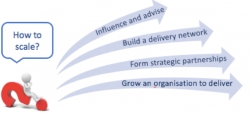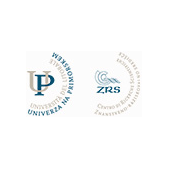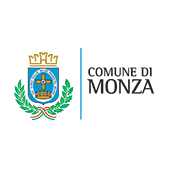Is it a matter of scale?
Is it a matter of scaling up sustainable innovations in order to transform societal systems of production and consumption into sustainable ones? And if so, how can sustainable innovations increase scale?
In the transition management literature, a difference is made between a dominant regime and niches. Niches can be regarded as sustainable innovations that are not yet at the stage of widespread diffusion, implying that a new more sustainable regime is not yet at the stage of stabilisation. From that point of view, niches already give a flavour of what sustainable systems of production and consumption might look like. Scaling up niches or sustainable innovations might accelerate the transition towards sustainable societal systems of production and consumption and thus have the potential to benefit a lot of people. That is why there is a strong argument for scaling up.
How to scale? According to Nesta, scaling is not just about growing organisations, it can also relate to various routes such as influencing and advising, building a delivery network, forming strategic partnerships and growing an organisation to deliver.
The case of Fairphone can serve as an example to demonstrate that scaling strategies can be different from growing your organisation. Fairphone is a sustainable innovation mapped jointly by Fairphone and the CASI project team and can be found in CASIPEDIA. Fairphone started in 2010 as a project of Waag Society, Action Aid and Schrijf-Schrijf to raise awareness about conflict minerals in electronics and the wars that they fuel and fund in the Democratic Republic of Congo. In 2013, they established an independent social enterprise to design and produce a ‘fair’ smartphone and take the next crucial steps in uncovering the story behind the sourcing, production, distribution and recycling of electronics.
Fairhpone has the ambition to improve the electronics value chain, one step at a time. Put differently, scaling and having impact is regarded as an important strategic ambtion by the Fairphone team. Fairphone has chosen to mainly put effort in the scaling route of the type of strategic partnering and more in particular, the approach of strategic alliances[1]. By producing a smartphone, Fairphone engages multiple suppliers in the production of a ‘fair’ smartphone. A concrete example is the dialogue set up with Philips. As a result of the Conflict Free Thin Initiative (CFTI), initiated by Boubon de Parma, special envoy natural resources for the Ministry of Foreign Affiars in the Netherlands, Fariphone stepped into a dialogue with Philips to explore the possibilities to jointly organising audits in two manufacturing companies in China. As a small and agile bee Fairphone aims to ‘pollinate’ the ‘trees’ with new ideas, in which the trees are the larger and established organiations such as Philips with greater reach and resources. By brokering and managing partnerships with other actors upstream and downstream in the supply chain of consumer electronics, Fairphone transfers knowledge, creates a sense of common values and mission, and allows a step change in scale.
[1] The analysis was carried out in a case study research undertaken under the 2012-2015 Policy Research Centre Program of the Flemish Government and can be accessed by clicking this link.
Relevant themes:
Public participation, Sustainable innovation, Raw materials, Resource efficiency
Relevant tags: Sustainable materials management
























